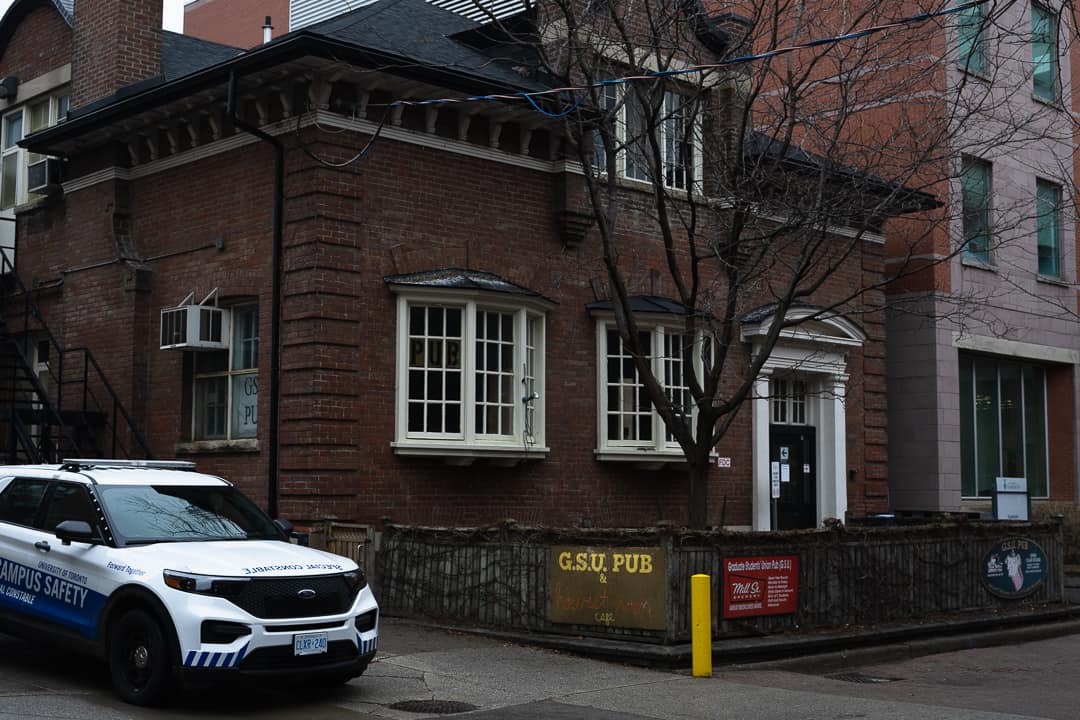After a fall term characterized by drawn-out meetings and unfulfilled agenda items, the University of Toronto Graduate Students’ Union (UTGSU) held its Annual General Meeting (AGM) on December 6, 2022. Among the presentation of executive reports and the audited financial statements, Vice-President Internal Sarah Alam tendered her resignation. The meeting ended after losing quorum and without passing the proposed bylaw amendments.
AGM’s reports and presentations
The AGM began with each member of the executive committee presenting a report to the general assembly about their activities. UTGSU President Lwanga Musisi said he had been observing and participating in U of T governance meetings that discussed “issues of relevance” to graduate students.
Danielle Karakas, vice-president academics and funding for the School of Graduate Studies (SGS) divisions 3 and 4, discussed her work on food insecurity with food bank donation drives, as well as a collaboration with Downtown Legal Services to provide students with legal assistance regarding academic appeals.
Vice-President Finance Neelofar Ahmed discussed her work on preparing for the union’s annual audit, as well as administering UTGSU bursaries and day-to-day financial tasks.
Dhanela Sivaparan, vice-president academics and funding for the SGS divisions 1 and 2, said she had been working on student advocacy issues regarding academic appeals and student-supervisor relations, as well as liaising with UTGSU caucuses on advocacy issues.
During her allotted presentation time, Alam told the general assembly she was resigning from her position. In her speech to the members, Alam said she had experienced “constant ongoing harassment” from certain members of the Board of Directors (BOD) and staff members since joining the UTGSU in 2020.
At the UTGSU meeting on January 25, 2022, Alam also brought up allegations of harassment against Adam Hill, who currently serves as a BOD representative for the SGS division 2.
At the January 2022 meeting, Hill had brought forward a motion to impeach Alam, alleging that she had “deliberately excluded” items from the 2022 AGM and September board meeting agendas.
Alam explained that the items had been circulated, but were voted down by the board members. Hill’s motion was ultimately tabled.
In her resignation letter, which was dated December 5, 2022, Alam specifically named Hill as a member who contributed to instances of harassment she experienced while working at the UTGSU.
Alam, who is a brown Muslim woman, wrote that interactions with certain members of the UTGSU “constantly reminded [me] that I am a racialized, marginalized body.”
“I am quitting UTGSU after due consideration to respect and value the time and resources of academic students, including myself, as my studies are my priority,” Alam wrote.
In an emailed statement to The Varsity, Hill wrote that he takes allegations of harassment “extremely seriously.”
“I have nothing against Sarah personally,” he wrote, adding that his concerns were related to the fulfillment of her duties as the vice-president internal.
One year of new structure
The 2022 AGM was also the first to be run under the Canada Not-for-profit Corporations Act (CNCA) rather than the Ontario Not-for-profit Corporations Act since a proposal to restructure the UTGSU’s board passed at the 2021 AGM.
The restructure established an executive committee with a president and five vice-president positions. The union explained that this restructuring would allow the organization to comply with the CNCA. Other U of T student unions, including the University of Toronto Students’ Union, operate under a similar structure. The proposal also altered the BOD to establish 20 division-based seats and seats for the executive committee, as well as 10 additional seats.
However, the union has struggled to fill these seats. The October 2022 meeting required a joint meeting between the BOD and the General Assembly because the BOD could not meet quorum to hold its own separate meeting.
The union has also faced challenges setting up a by-election to fill vacant positions, as members have failed to come to an agreement on the process for nominating a Chief Returning Officer (CRO) committee who would then nominate a candidate to serve as the CRO and administer the by-election process.
UTGSU bylaws require the BOD to organize a nominating committee made up of one former election committee member, the Executive Director, and one other BOD representative. Due to the vacancies, the task of finding a CRO candidate for nomination was passed on to the UTGSU staff members.
But this decision was challenged by some members. Concerns around the CRO nomination process and its ability to comply with the bylaws prompted long discussions at both the October and November General Assembly meetings.
The AGM agenda included an item for a proposed bylaw amendment to give the BOD or Executive Committee the ability to elect a CRO nominating committee, in the event that the members required to elect a nominating committee as outlined in the bylaws are unavailable. However, the bylaw amendments were not put up for a vote at the AGM due to the loss of quorum.
The Varsity reached out to the UTGSU to clarify how this would impact the by-election but did not receive a response by the time of publication.


